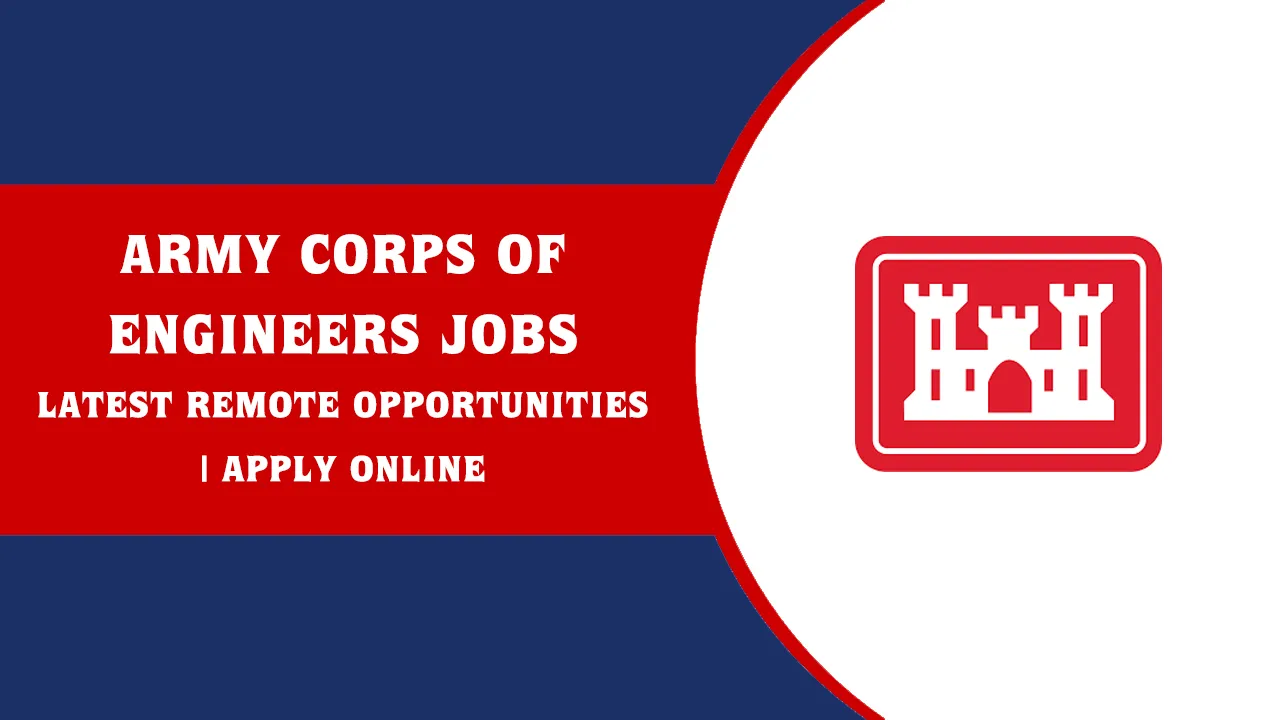Individuals who are tired of routine jobs and are ready to join an agency that builds, maintains, and protects the nation’s key infrastructure should check out Army Corps of Engineers jobs. Finding a job that combines stability, purpose, and long-term career growth is something that many Americans are aiming for. As the job market continues to develop, more people are shifting their focus from private companies to government employment. Especially within federal agencies that offer meaningful work and excellent benefits.
There are numerous occupations available, but the Army Corps of Engineers Careers always stands out. While it may sound like an organization that is exclusively for military members, the reality is that it offers thousands of opportunities for civilians across the United States. Whether someone is fresh out of college or looking for a mid-career change, this overview will walk them through every step of applying to USACE jobs. Therefore, don’t miss your chance to join a team that’s defining the nation’s future and submit your application now.
For More Latest Government Jobs: Click Here
| Company Name: | Army Corps of Engineers |
| Job Locations: | United States |
| Last Updated on: | August 15th, 2025 |
Army Corps of Engineers Jobs Near Me Across United States

About the Army Corps of Engineers
The U.S. Army Corps of Engineers is one of the most respected and far-reaching federal agencies in the country. It operates under the Department of Defense but employs mainly civilian workforce, focusing on engineering, construction, and environmental services. Its roots date back to 1775, which makes it one of the oldest institutions in the American government. Although it originally started with a focus on military engineering, the organization has since grown into a multidisciplinary agency. USACE is currently led by Lieutenant General William H. “Butch” Graham Jr., who serves as the 56th Chief of Engineers and Commanding General.
It serves both military and civilian missions on a large scale. The agency’s impact stretches across all fifty states and even into international territories where U.S. interests are involved. USACE employs more than 39,000 civilian staff, which ranks it among the largest engineering organizations in the world. These professionals work out of more than 40 district offices and 8 division headquarters strategically located throughout the United States. Additionally, the agency maintains field offices and support teams in other parts of the world to support global operations and disaster response efforts.
Why Work for the Army Corps of Engineers?
Choosing to work for USACE is not just about landing a federal job. It’s about taking on a larger mission that combines national service and professional excellence. For those who find meaning in building safe communities, protecting natural environments, and contributing to military readiness, this organization offers an exceptional and rewarding career path. Employees here are part of important civil engineering projects that influence the nation, from flood protection systems to emergency recovery efforts.
Here, career development is more than just catchphrases. The agency takes pride in helping its employees grow through technical training, leadership courses, and support for certifications and education. These resources are designed not only to improve job performance but also to expand each individual’s long-term potential in the federal service. This dedication to growth ensures that people are not just filling roles, but actively establishing meaningful careers. Additionally, here are some reasons why working here is a great idea:
- Employees often find themselves working on historic infrastructure projects that are nationally significant and highly visible, making every project feel like a legacy.
- Many positions allow for interagency collaboration, including work with FEMA, the Department of the Interior, and international partners, offering a wider professional network.
- The agency supports job rotation and temporary duty assignments, allowing workers to develop skills in different regions and disciplines without switching employers.
- Leadership programs are offered to both new and mid-career professionals, giving them the tools to move into management or specialized technical roles.
- Federal employees have access to mentoring networks and employee resource groups that support veterans, women, minorities, and other communities in the workplace.
- Engineers, scientists, and planners often get the chance to brief local, state, and even national decision-makers, offering a level of visibility and responsibility that’s uncommon in the private sector.
Types of Jobs Available
There are plenty of Army Corps of Engineers jobs available, ranging from engineering to environmental sciences to IT and construction. These positions are based in offices, field stations, construction sites, and even regional command centers. Each job type supports a piece of the agency’s larger mission, whether that’s protecting natural resources, maintaining safe waterways, or supporting the military. Below are some of the most common and important job categories available within the agency.
Engineering Roles (Civil, Electrical, Mechanical)
The majority of the agency’s operations are based on engineering jobs. Civil engineers work on flood protection systems, bridge designs, and dam maintenance projects. Electrical engineers help design and oversee the power systems for locks, levees, and military infrastructure. Mechanical engineers focus on the construction and maintenance of operating systems, which include large floodgates and pumping stations. These professionals are key to ensuring the safety, efficiency, and durability of the nation’s infrastructures.
Trades and Operational Jobs
Tradespeople such as electricians, mechanics, and equipment operators are in constant demand, especially at dams, power stations, and lock facilities. Lock and dam operators, for example, monitor the safe passage of ships through waterways and maintain the equipment that makes it all work. These are practical roles that offer stability, skill development, and play an important role in national transportation systems.
Construction & Project Management
Construction managers and project specialists oversee large-scale projects from start to finish. They coordinate contractors, inspect building progress, ensure safety protocols are followed, and manage budgets and timelines. These roles are of great importance during both civil and military construction efforts, where the stakes are high and the deadlines are strict. Strong communication and leadership skills are necessary for success in this area.
Administrative & Contracting
Behind every successful project is a team handling logistics, budgeting, and legal paperwork. Administrative professionals keep everything on track by managing records, supporting senior staff, and ensuring that regulatory requirements are met. Contracting specialists, meanwhile, handle the procurement process, including bidding, vendor selection, and compliance. These positions are key to the agency’s financial and operational stability.
Park Rangers & Natural Resource Specialists
Park Rangers and natural resource specialists manage the agency’s recreational and environmental assets. This includes lakes, trails, wildlife areas, and campgrounds maintained by the Corps. Their duties include educating the public, ensuring the safe use of facilities, and monitoring wildlife populations. These positions combine public interaction with practical conservation, often appealing to those who love the outdoors.
Army Corps of Engineers Jobs Near Me
With offices and field projects spread across the United States, Army Corps of Engineers jobs are more accessible than many people realize. Locations range from small field offices to regional district hubs and include both urban and rural environments. Depending on the location, available roles may focus on civil works, construction oversight, environmental management, or public engagement. Here’s a closer look at three key cities where opportunities are especially notable.
Independence, KS
In Independence, Kansas, the USACE maintains oversight of several nearby water infrastructure projects, including reservoirs and flood management systems. While it is not one of the agency’s largest hubs, it supports the surrounding rural and agricultural region. Work here often centers on dam maintenance, environmental monitoring, and recreational site management. Civilian roles in this area are field-focused, with plenty of opportunities for technicians, park rangers, and entry-level engineers.
Tulsa, OK
Tulsa is home to one of the agency’s largest district offices, which cover a large portion of the southwestern United States. The Tulsa District oversees flood control systems, hydropower plants, and water infrastructure that supports millions of people in Oklahoma, Kansas, and parts of Texas. Job seekers in Tulsa will find an extensive range of positions including civil engineering, contracting, administrative support, and environmental science. The office serves as a hub for both regional planning and emergency response, making it an exciting place to pursue a career.
Sacramento, CA
Sacramento is one of the most active locations for USACE due to the state’s complicated water infrastructure and recurring flood risks. The Sacramento District manages an extensive civil works portfolio that includes flood risk reduction, levee reinforcement, and ecosystem restoration along the Sacramento and San Joaquin rivers. With a heavy focus on engineering, biology, and project management, this area frequently posts openings for specialized and senior-level roles. It’s an excellent place for professionals seeking large-scale, high-impact projects that combine technical work with environmental responsibility.
Salary and Benefits
With Army Corps of Engineers jobs, you’ll benefit from a structured pay plan based on the federal General Schedule (GS) scale. Most entry-level positions begin at GS-5 or GS-7, with civil engineers typically earning $45,000 to $60,000 and growing into six-figure salaries at the GS-12 or GS-13 levels. Electrical and mechanical engineers may start around $50,000 to $65,000, while biologists and environmental scientists often begin at $48,000 to $58,000. Contracting officers with experience can earn over $90,000, and IT specialists or engineering technicians may range from $45,000 to $80,000 depending on their duties and grade level.
Several factors influence where someone lands on the pay scale. Location plays a significant role, as the federal government uses “locality pay” adjustments to account for cost-of-living differences in areas like San Francisco, New York, or Washington, D.C. Education and specialized certifications can also significantly increase a candidate’s starting level. For instance, someone with a master’s degree in environmental engineering or a PE license may qualify for a higher GS grade right from the beginning. Moreover, the agency has the following benefits to offer.
- Access to life insurance, dental, and vision plans is available through optional benefit programs, often at group-discounted rates.
- The agency supports work-life balance through flexible work schedules, telework eligibility, and employee assistance programs.
- Long-term employees can “buy back” military or prior federal service time to increase their retirement annuity payout.
- Many field positions include per diem and travel reimbursement when working on temporary duty assignments across regions.
- Civilian employees have access to wellness resources including mental health counseling, fitness centers at larger facilities, and preventive health screenings.
Eligibility Criteria
There are several reasons why not everyone qualifies for Army Corps of Engineers jobs. The agency contributes to public safety, national defense, and infrastructure management, so high standards are part of the selection process. Most roles begin with an educational foundation that is relevant to the job at hand. Engineers usually need at least a bachelor’s degree in civil, electrical, mechanical, or environmental engineering. For biologist or environmental science roles, degrees in the related sciences are required. Administrative roles may only require an associate’s or bachelor’s degree in business or public administration. On the other hand, trade jobs often require technical training or apprenticeships instead of a formal college education. Listed below are some additional criteria.
- Most engineering roles require accreditation through ABET-approved programs, and some positions mandate passing the Fundamentals of Engineering (FE) exam.
- Park ranger candidates often need a combination of coursework in the natural sciences and experience in visitor services or recreation.
- Environmental scientist roles frequently ask for documented lab or fieldwork experience in addition to academic credentials.
- Administrative support staff must often demonstrate typing speed, document management knowledge, or specific clerical competencies through tests or prior federal service.
- Some technician positions require passing physical fitness standards or proving capability for fieldwork in rugged environments.
- Applicants who hold dual citizenship may be ineligible for roles involving sensitive information or high-level security clearances.
- Veterans can leverage specific hiring authorities such as Veterans’ Preference or the VRA program to compete for positions with fewer competitive barriers.
- Individuals applying under Schedule A (Disability Hiring) must provide supporting medical documentation and meet basic job qualifications to be considered.
How to Apply for Army Corps of Engineers Jobs?
The application process for Army Corps of Engineers jobs normally begins at USAJOBS.gov and the Army Civilian Service website. These platforms serve as the central hub for all federal civilian openings, which allow applicants to filter jobs by title, location, salary range, and hiring path. Job seekers must first create an account on USAJOBS, create a detailed profile, and upload necessary documents such as transcripts, certificates, and resumes. Once the profile is set up, users can save job searches and receive alerts whenever new openings are posted. The Army Civilian Service site also provides additional tools, which include outreach for special hiring programs and career fields in demand.
Creating a strong federal resume is key to successfully landing one of these roles. Unlike traditional resumes, federal resumes must be extremely detailed, often running several pages long. They need to include specific duties, hours worked per week, and accomplishments that have measurable results. Once an application is submitted, the review process can take anywhere from a few weeks to several months. Applicants may be contacted for interviews, which are usually conducted virtually or over the phone. After an offer is made, most candidates will still need to pass a background check, and in some cases, medical evaluations or security clearance reviews.
Summary
For those seeking fulfilling federal careers, Army Corps of Engineers jobs offer an ideal combination of impactful work and long-term professional growth. These roles give civilians an extraordinary chance to serve the public through engineering, construction, environmental management, and emergency response. With opportunities across the country and across all disciplines, candidates can find positions that match their expertise and goals. So, anyone serious about pursuing a career in the public service should stay updated on openings and apply today.
 Find Newest Jobs in USA
Find Newest Jobs in USA



